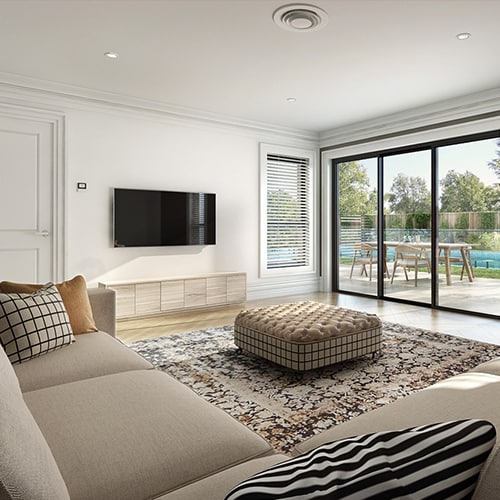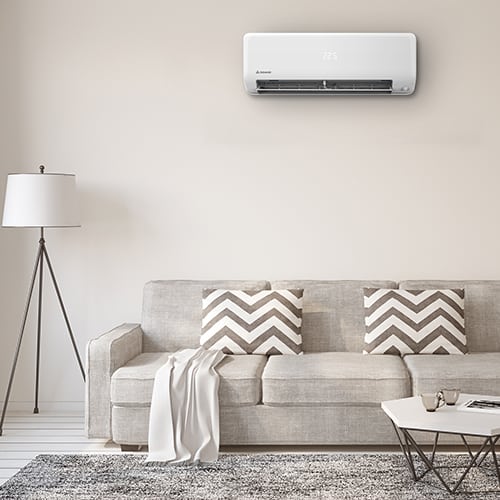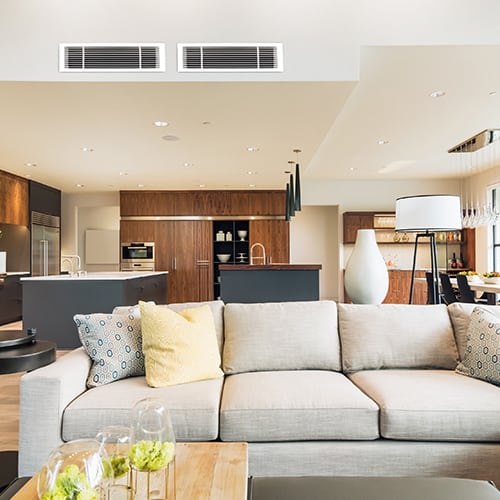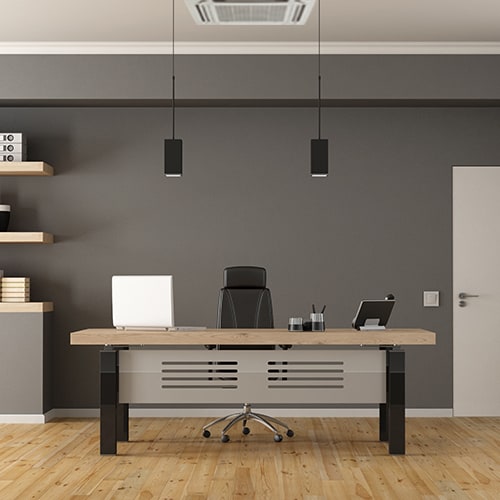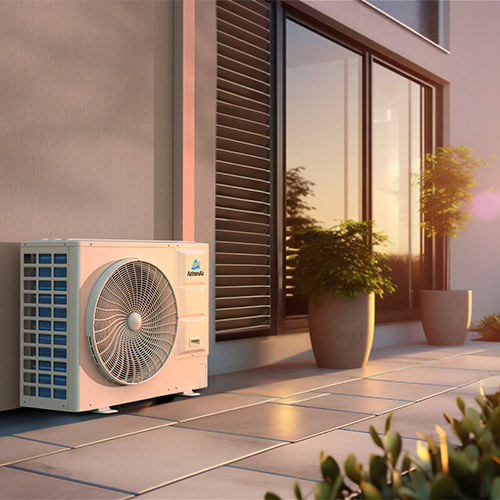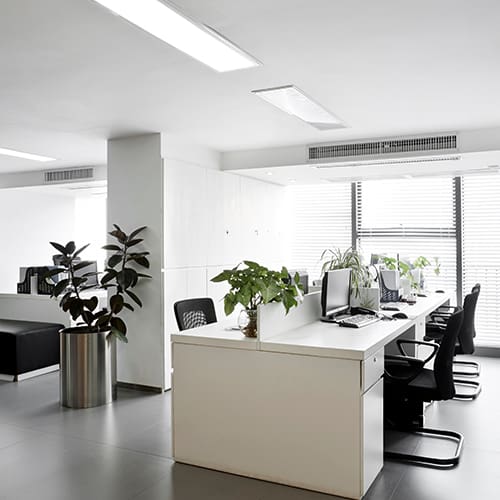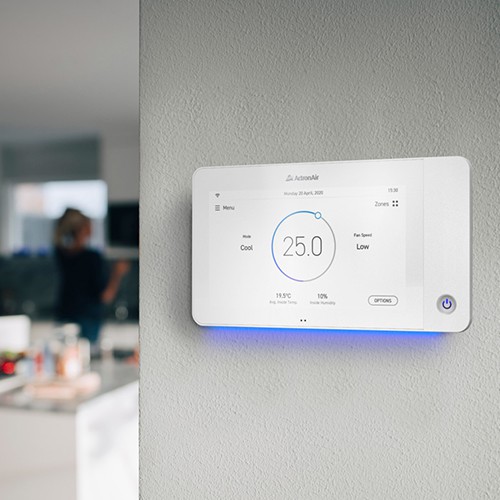If it’s blistering hot outside, your instinct may be to turn your home into an icebox. The same applies in reverse. You probably want a warm and cosy environment after seeing the first signs of frost.
While these instincts may make you slightly more comfortable, they can have a dramatic impact on your energy bills and energy efficiency. This article offers a blueprint to know how much energy your air-con uses and how it affects your energy consumption. Understanding these facets can ensure a home that’s as energy-efficient as it is comfortable.
Find Your Ideal Temperature for Summer
Your air conditioner has to work hard to cool down a room on a hot day. As a result, it uses more electricity, which increases your energy bill. How much you pay will depend on the difference between the outdoor temperature and the one you set on your AC unit.
Experts recommend that you set your air-con for 8°C cooler than the outside temperature. This mark optimises your unit’s energy efficiency and reduces wear and tear. That way, your air conditioning unit can maintain peak performance for years to come.
Even a single degree cooler can cost you a lot of money. The same experts who recommend setting your system 8°C cooler say that 1°C cooler adds 10% to your running costs. If the resulting temperature doesn’t meet your expectations, consider running your ceiling fan to offset the heat.
Find Your Ideal Temperature for Winter
Remember all those rules about finding the ideal temperature for the summer? They apply in winter as well. That way, you can keep your cockles warm during the frigid winter months.
Reverse-cycle air conditioners offer the perfect solution. They rank as one of the most energy-efficient and cost-effective ways to heat spacious homes. They run laps around electric and gas heaters, saving you a small fortune in the process.
The cost of a reverse-cycle air conditioner will depend on your property size. A cosy studio or one-bedroom apartment would be best suited to a split system reverse cycle unit such as the Serene 2. Meanwhile, a multi-bedroom home would benefit from a ducted system.
Don’t forget the rule about setting your indoor temperature 8°C above the outdoor temperature. It will provide you with optimal warmth and energy savings. Add in some new insulation (more on that later), and you can stay toasty for less this winter.
Get the Right AC Unit for Your Home
Finding a suitable AC unit for your home is a lot like Goldilocks and the Three Bears. If the air conditioning unit is too small, it won’t adequately cool your home. If it’s too large, you’ll spend more money than necessary. You need to find the option that’s just right.
Start by calculating the square meterage of the room or house in question. If you haven’t attended maths class in a while, multiple the floor’s width by its length. This figure will let you compare your room size to the BTU rating.
BTU stands for British thermal unit and is a measurement of thermal energy. It calculates how much heat a room needs to raise one pound of water by one degree Fahrenheit. Here are the guidelines for utilising BTUs:
- 14 to 32.5 square metres: 5,000 to 8,000 BTU
- 32.5 to 51 square metres: 8,000 to 12,000 BTU
- 51 to 97.5 square metres: 12,000 to 18.500 BTU
- 97.5 to 148.5 square metres: 18,500 to 25,000 BTU
What air conditioner you purchase depends on a couple of other factors. For instance, how often are you going to run it? If you plan on using it year-round, opt for a high-end model. However, if you only want to use it during heatwaves, downsize your unit and save some money.
Other factors worth considering include the amount of shade or sun that the room receives and whether the device has smart technologies. Researchers have found that blackout curtains can reduce the amount of heat transferred via windows by as much as 24%. That shade can keep your property cool on hot days. Similarly, smart features let you program your AC unit so that it uses more energy when you’re home and less while you’re gone.
Install the AC Unit in the Right Spot
Location, location, location. It’s the principal rule of real estate, and it also applies to air conditioning units. Whether you have a split-system air conditioner or ducted one, the placement can determine how much money and energy you save.
A professional can assess your home before the installation. They may make recommendations to reduce your air conditioning dependence. For instance, if you have a wall-mounted unit, you’ll want it to circulate air lengthwise across the entire room without interference. This position allows the cool air to reach every corner of the room.
Research the Energy Rating Labels
All air conditioners are not equal. You can notice some of the differences in their energy ratings. These labels calculate the running costs of a unit based on average usage. It provides consumers with a rough idea of how cost-effective specific air conditioning systems are.
All air conditioners must have a Zoned Energy Rating Label (ZERL) in Australia and New Zealand. This means that the system can handle three climate zones (hot, cold, and average). The label can also answer questions like:
- How much noise does the air conditioner make?
- How much electricity does the air conditioning unit use?
- How efficient is the system compared to the average unit?
- How much heating and cooling power can the air conditioner produce?
The energy label ratings offer a simple and straightforward way to compare air conditioners. If you want a more in-depth analysis, you can look at the power input and capacity output. Note that these numbers and energy label ratings work best for comparing similar products.
Insulate Your Home
Your insulation might be the most underappreciated part of your home. It resists heat flow and reduces your heating and cooling costs. Think of it like Tenzing Norgay, the Sherpa who helped Sir Edmund Hillary become the first person to summit Mount Everest but never received international recognition.
First, insulation keeps your air conditioning inside your home. Whether you have hot or cold air circulating, it prevents that precious air conditioning from escaping, keeping your house at the ideal temperature.
Second, your air conditioning unit doesn’t have to work as hard if you have high-quality insulation. All the AC unit has to do is maintain the status quo. If air escapes through cracks or holes in your insulation, your system will need to exert more energy to achieve the temperature you want.
Third, new insulation allows you to feel better about the environment. The energy-efficient material reduces carbon dioxide emissions from power plants and your carbon footprint. It also makes a small but meaningful difference in the climate crisis.
Fourth, insulation functions as a sound-proofer. No one wants a noisy home, whether that’s noise from the outside like sirens, neighbours, traffic, or noise from the inside, such as kids or loud music. Acoustic insulation reduces unwanted sound and makes your indoor life more pleasant.
Need one more reason to invest in insulation? Adding it will save you a lot of money. Experts say that homeowners save an average of 15% on their heating and cooling expenses when they put new insulation in their attics and spaces. That translates to 11% savings on overall energy costs.
Bonus Tips to Save Money
Upgrading your air conditioner ranks as one of the easiest and most effective ways to trim your energy bills. It’s not the only way, though. For starters, you should perform routine cleaning and maintenance on your AC unit.
Proactive repairs ensure that your air conditioner remains in tip-top shape. It guarantees that you won’t have more extensive and expensive repairs in the future. Changing your air filters once every one to three months and wiping down the louvres can prevent your system from becoming an energy guzzler.
Other ways to save money include:
- Using the eco-friendly settings on your air conditioner
- Using zoned cooling if you have a ducted air conditioning unit
- Turning your aircon off while you sleep
- Adding curtains to keep your interior cool
- Using a ceiling fan or pedestal fan to circulate cool air
- Starting the AC unit in the morning on hot days instead of waiting until it gets hot
Boost Your Energy Efficiency Today
A few tweaks to air conditioning can make a massive difference for your bottom line. Setting the proper temperature can optimise your energy efficiency, while new insulation can improve air retention. Even something as small as adding blackout curtains to your home can lower your air conditioning bill.
At ActronAir, we offer a wide range of world-class air conditioners that can keep your home at the perfect temperature. Check out our energy-efficient ducted air conditioners to find a product that fits your lifestyle choices. Don’t hesitate to contact our support staff if you have any questions.


